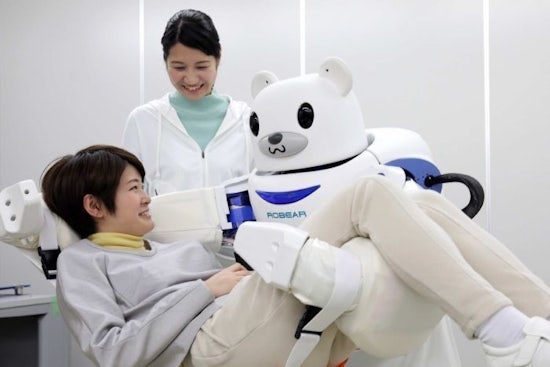Japanese ‘Robear’: nurse of the future
Robotic nurses with cute bear faces developed by Japanese engineers could soon be the future carers of the nation’s growing elderly population.

Robotic nurses with cute bear faces developed by Japanese engineers could soon be the future carers of the nation's growing elderly population.
Japanese research institute, Riken, developed the Robear to support healthcare workers, with enough power to lift frail patients from bed and support unstable patients on their feet.
The Robear is based on an earlier model called RIBA, which was introduced in 2011. The upgraded Robear is about 90 kilograms lighter than its predecessor, capable of more subtle movements and sports an even cuter look.
The 140kg Robear can lift frail patients from a wheelchair to a bed or a bath, with the polar cub-like look aimed at radiating an atmosphere of strength, geniality and cleanliness at the same time.
Research leader, Toshiharu Mukai, says his team voted for this design among options presented by its designer.
“We hope to commercialise the robot in the not too distant future,” Mr Mukai says.
High tech ‘skyscraper graveyards’ are one of the ways Japan’s booming funeral industry is responding to the nation’s rapidly ageing population.
A historically low birth rate and ever increasing life expectancy means Japan’s population of elderly people is growing, while the pool of youngsters to look after them is shrinking.
Japan’s declining population puts it on course to lose half its workforce by 2060, and possibly its status as an economic superpower.
Despite calls for large scale immigration into the racially homogenous country, residents remain reluctant, meaning an increasing reliance on robots, especially to perform physically difficult work.
This frequently combines with the country’s love of all things cute, to produce machines with disarming faces and child like voices.
Riken aims to combat the burden Japan’s ageing population would place on the healthcare system.
“As Japan is ageing with fewer children, the problem of a shortage in caregivers for the elderly is getting serious,” Riken claims in a statement.
“Expectations are high that robotics will help resolve this problem.”
Showcasing Australian products and services overseas
While Japan is known for its advanced innovation in technological healthcare designs, many countries around the world are now looking to Australia’s aged care system as a benchmark of quality healthcare.
Initiated and funded by the Australian Trade Commission (Austrade) and developed by DPS Publishing, publishers of DPS News, as well as other leading Australian aged, community care and retirement living publications, SeniorsHealthExports.com.au offers exporters, and potential exporters, the chance to showcase their business and services.
Austrade is an Australian government organisation with a global network of 90 offices across 50 countries. Austrade’s role is to advance Australia’s international trade, investment, and education and tourism interests by providing information, advice and services.
According to Dugald Anthony, Austrade Trade Adviser International Health, until recently, the concept of aged care services and support in many Asian markets did not exist as the traditional Asian culture expected families to look after their ageing family members.
“With a burgeoning senior population, changing household dynamics and increasing wealth, the aged care or Senior Living industry in Asia has become a new growth industry,” Mr Anthony says.
The recent launch of the Australian Seniors Health & Living Directory offers all countries the opportunity to consider Australian products and services to assist them to meet the needs of their ageing populations.
Complementing the Australian Seniors Health & Living Directory is www.seniorshealthexports.com.au – an online directory offering a key word search facility, as well as providing comprehensive information including contact information, branding, and links to websites, areas of industry expertise and a 100 word capability statement.
Whether an international company, vendor, purchaser or investor, this print and online directory will help you to find the product, technology or service you are looking for to meet the healthcare needs of your older customers.
Download the Australian Seniors Health & Living Directory flip book, or find out more about exporting seniors health and living products and services via the Seniors Health Exports website.











![The new Aged Care Act exposure draft is slated for release in December of 2023, but advocates hope to see it rolled out on January 1, 2024. [Source: Shutterstock]](https://agedcareguide-assets.imgix.net/news/articles/wp/agedcareact__0811.jpg?fm=pjpg&w=520&format=auto&q=65)












Comments